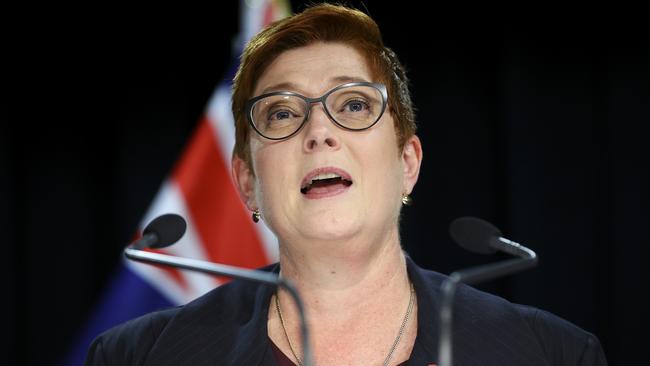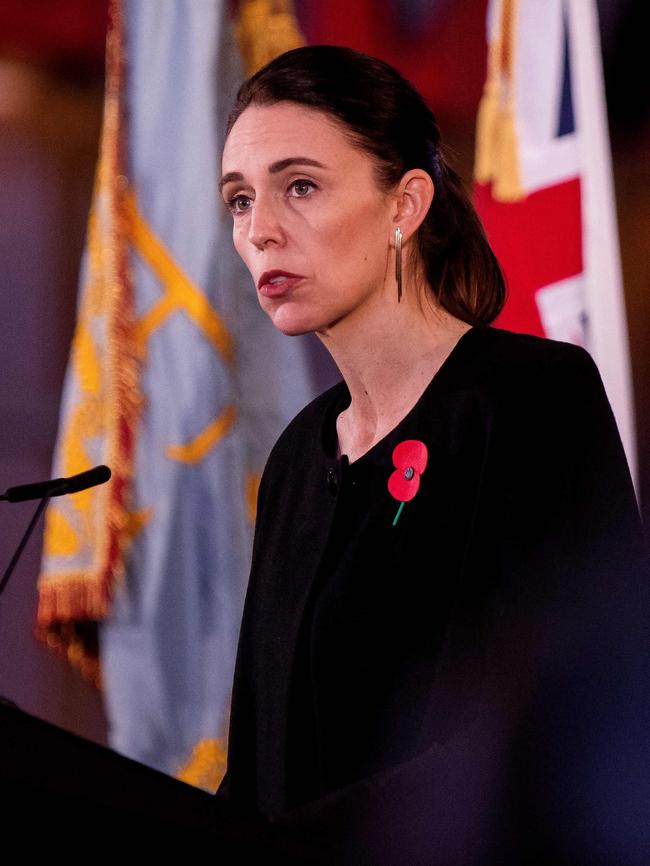Payne blasts Beijing tactic of ‘debt trap diplomacy’
Marise Payne has attacked efforts to ‘buy influence’’ and ‘pick off’ individual countries in a diplomatic rebuke aimed at China.

Foreign Minister Marise Payne has attacked efforts to “buy influence’’ and “pick off’’ individual countries in a diplomatic rebuke aimed at China ahead of two weeks of international talks with some of the world’s biggest democracies on strengthening global security.
Senator Payne, who will visit London for G7 Plus talks before high-level meetings in Geneva and the US, said the benefits of free and open societies had “never been clearer’’.
Her comments, in an opinion article for The Australian, follow a warning by US Secretary of State Antony Blinken that China was acting “more repressively” and “more aggressively” as it pursued greater global influence.
As Beijing’s Belt and Road deals have saddled developing nations with potentially unsustainable debt, Senator Payne said Australia would work with “indispensable” international partners to show “the demonstrable improvements” that democratic values could deliver to people’s lives.

“We do not try to buy influence to advantage our individual countries; rather, we know that a stable, secure neighbourhood of sovereign states, in which we have networks of familiarity and trust, are good, safe places for our people to live and thrive,” she said.
“Our focus and our ability to solve practical problems stem from our understanding that these efforts create regional and global stability, not because by doing so we expect to achieve targeted influence in individual countries that we pick off as notches on our belts.”
After a series of trade sanctions on Australian beef, wine, barley and coal imposed by the Chinese government as retribution for calls for an independent inquiry into the origin of the coronavirus, Senator Payne called for a rules-based trading order.
“If there is a spreading of influence it is the spreading of openness, freedom and trade that benefits everybody because we compete fairly based on rules,’’ Senator Payne writes.
“It is not a mercantilist approach, rather one that seeks to support a productive and peaceful international community.’’
Senator Payne will visit Washington on the final leg of her trip, for the Morrison government’s first face-to-face ministerial talks with the Biden administration.
“When it comes to indispensable relationships, there is no keystone of the architecture I have described that is more indispensable than the Australia-United States alliance,” she said.
Mr Blinken, who will be at the table with Senator Payne at the G7 Plus foreign ministers’ meeting, said in an interview on Monday (AEST) that China was the one country in the world with “the military, economic, diplomatic capacity to undermine or challenge the rules-based order”.
“What we’ve witnessed over the last several years is China acting more repressively at home and more aggressively abroad — that is a fact,” he said in an interview with CBS’s 60 Minutes.

But he said the Biden administration did not want to “contain China” or hold it back, just uphold the global rules-based order “that China is posing a challenge to”.
New Zealand Prime Minister Jacinda Ardern, in a speech on Monday, expressed concerns over China’s behaviour, including the way it “treats its partners”, and human rights concerns in Xinjiang. “We need to acknowledge that there are some things on which China and New Zealand do not, cannot, and will not agree,” she told the China Business Summit in Auckland.
“This need not derail our relationship; it is simply a reality.”
Her comments come amid concerns New Zealand is taking a softer stance on China than its Five Eyes allies.
China’s President Xi Jinping — who has told his officials “the East is rising while the West is declining” — said last month the world was in a “phase of fluidity and transformation”. “Instability and uncertainty are clearly on the rise,” he told political and business leaders at the Boao Forum for Asia, China’s biggest annual international gathering.
But Mr Xi sought to allay fears about China’s growing military power, accompanied by an increased tempo of operations in the South China Sea, Taiwan Strait and East China Sea, and a deadly clash on its disputed mountainous border with India. “However strong it may grow, China will never seek hegemony, expansion, or a sphere of influence,” he said.
Foreign Minister Wang Yi warned the Biden administration in recent days against forming a “small clique” against China.
“Some people in the US have repeatedly stated they want to strengthen the rules-based international order. If it is only a rule set by Western countries, it only covers 12 per cent of the people in the world and cannot become a general rule for all countries.”
Senator Payne will attend the G7 Plus foreign and development ministers’ meeting from May 4-5 with counterparts from Canada, France, Germany, India, Italy, Japan, South Korea, South Africa, the UK, US and the ASEAN chair.







To join the conversation, please log in. Don't have an account? Register
Join the conversation, you are commenting as Logout